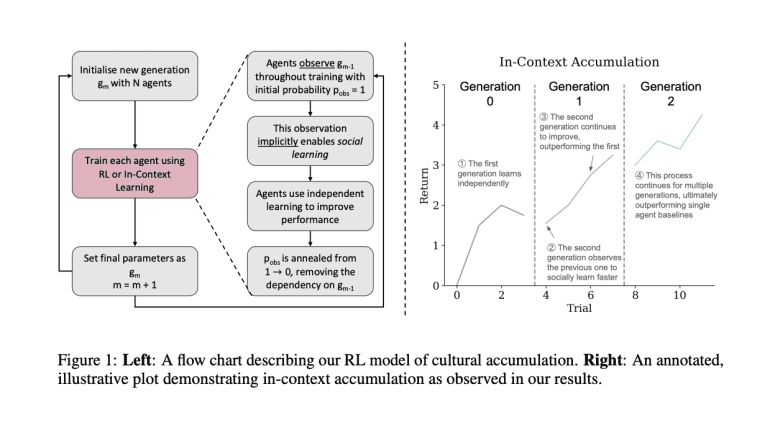- Traditional AI learning models fail to capture generational knowledge transfer observed in humans.
- New models balance social learning with independent exploration, enabling perpetual knowledge and skill accumulation.
- Two models, in-context and in-weights accumulation, explore different aspects of cultural accumulation.
- Evaluation across diverse environments shows superiority over single-lifetime RL baselines.
- Cultural accumulation models promise more adaptable and resilient AI systems.
Main AI News:
As businesses delve deeper into the realm of artificial intelligence, the quest to replicate human-like learning processes becomes increasingly paramount. Cultural accumulation, the ability to imbibe knowledge and skills across generations, stands as a cornerstone of human success. However, traditional methodologies within artificial learning systems, particularly deep reinforcement learning (RL), have predominantly operated within the confines of a singular “lifetime” learning paradigm. This approach, though effective to a certain extent, fails to encapsulate the generational and perpetual essence inherent in human cultural evolution.
The Landscape of Cultural Learning: Innovations and Challenges
Various methodologies have been explored to foster social learning and cultural accumulation within artificial agents. Techniques such as expert dropout and Bayesian reinforcement learning with constrained inter-generational communication have offered glimpses into this domain. Nonetheless, these approaches often hinge on explicit communication channels or domain-specific representations, constraining their broader applicability within diverse environments.
Charting New Territories: A Paradigm Shift in Cultural Accumulation
In response to these limitations, researchers have proposed a groundbreaking approach that redefines cultural accumulation within artificial reinforcement learning agents. By meticulously balancing social learning with independent exploration, these agents can navigate the complexities of knowledge and skill acquisition across multiple generations. This pioneering work represents a paradigm shift, heralding the emergence of more adaptable and open-ended learning systems.
Exploring the Constructs: The Architecture of Cultural Accumulation
Two distinct models have been devised to probe the intricacies of cultural accumulation within agents: in-context accumulation and in-weights accumulation. In-context accumulation entails a meta-reinforcement learning process that adapts to new environments, leveraging episodic generations for knowledge accumulation. Conversely, in-weights accumulation involves training successive generations from randomly initialized parameters, with each generation refining the network weights for skill accumulation.
Navigating the Terrain: Evaluating Cultural Accumulation in Action
To assess the efficacy of cultural accumulation models, researchers have curated three diverse environments: Goal Sequence, Travelling Salesperson Problem (TSP), and Memory Sequence. These environments serve as crucibles for agents to discover, transmit, and refine information across generations, mirroring the dynamic processes observed in human cultural evolution.
Achieving New Horizons: Unveiling the Results
The results of these endeavors underscore the transformative potential of cultural accumulation models. In the Memory Sequence environment, agents trained with the cultural accumulation algorithm surpassed conventional RL baselines, showcasing the prowess of perpetual learning mechanisms. Similarly, in the Goal Sequence environment, cultural accumulation yielded substantial performance enhancements, especially in scenarios with higher but imperfect oracle accuracies, highlighting the resilience of these agents in navigating complex, partially observable tasks. Furthermore, in the TSP environment, cultural accumulation facilitated sustained improvements, with agents optimizing their routes across successive generations.
Conclusion:
The emergence of cultural accumulation models represents a paradigm shift in the landscape of artificial reinforcement learning. Businesses investing in AI technologies should take note of these advancements, as they herald the advent of more adaptable and resilient systems capable of perpetual learning and evolution. Embracing these models can unlock new opportunities for innovation and competitive advantage in an increasingly dynamic market.

